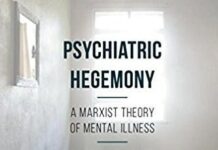“Virtual Autism” May Explain Explosive Rise in ASD Diagnoses
New clinical case studies have found that many young children who spend too much screen time—on TV’s, video games, tablets and computers—have symptoms labeled as “autism.” When parents take away the screens for a few months the child’s symptoms disappear.
After Seroquel
The topic of this article is Seroquel withdrawal: the process of withdrawal and the consequences of having taken this particular chemical for over ten...
Holistic Recovery From Schizophrenia: A Mother and Son’s Journey
I am a mother of a son who was given a diagnosis of schizophrenia in December 2003, a son who is doing well today...
I Don’t Believe in Autism
The conversation about what truly constitutes “autism” is an ongoing one. Although I resist the label personally, I do not begrudge anyone for identifying as autistic, or seeking out an autism diagnosis. Leaving this discussion within the domain of medicine is limiting. That’s why a new discourse is emerging, not among doctors, but among activists who push for autistic self-advocacy.
Psychiatric Hegemony: A Marxist Theory of Mental Illness
In Psychiatric Hegemony: A Marxist Theory of Mental Illness, Bruce Cohen explains the expanding power and influence of psychiatry in terms of its usefulness to the capitalist system — the more useful it is, the more power it is given, and the greater its power, the more useful it becomes.
Makers of Risperdal Sued for Breast Development in Boys
Thousands of boys and young men are lined up in courthouses around the country to sue J&J for gynecomastia caused by taking Risperdal as young children. The condition is irreversible except by surgical removal. Collectively, they have become known as the Risperdal Boys.
Electroshocking Children: Why It Should Be Stopped
In a recent commentary, University of Toronto historian Edward Shorter laments the efforts of people like myself in states like Texas who have successfully put limits on shocking children in order to induce grand mal convulsions. His argument is that we who have fought against this are denying children a benevolent medical treatment. In order to understand why Shorter’s plea to use electroshock on children is so egregious, we need to know what it does to children’s brains, which means a look at the science.
Stop The War On Chronic Pain Patients
Much has been written lately about an "epidemic" of opioid overdose deaths, in some cases advocating for a blanket reduction in the availability of prescription opioids. Regrettably, many readers will not penetrate beneath the sensational headlines to grapple with the complicated realities of this issue. Few who aren't themselves in pain may realize what harm such articles are doing to tens of millions of people.
A Mother’s Very, Very Worst Nightmare
I was Marci’s former psychotherapist. When I heard what had happened, I immediately informed the detectives that I suspected that the homicide and suicide attempt were related to psychiatric drugs.
Optimizing Mental Wellness Through Nutrient Therapy: A Gastroenterologist’s Perspective
It was hard to believe, initially, that nutrient therapy could have that profound an impact. My son’s remarkable recovery with “just nutrients” has made me question the entire medical model behind ADHD and other neurobehavioral disorders.
Adam Maier-Clayton: Assisted Suicide and Mental Illness
If we describe “death with dignity” as a benefit, a good thing, a release and relief and a mercy for people with chronic unbearable and unmanageable pain, why do we also describe exclusions from assisted suicide for people with mental illness as a protection rather than discrimination?
Is Xanax Really the Bad Guy?
While any effort to generate awareness and potentially curb the benzodiazepine epidemic is commendable, we have to ask ourselves, is Xanax just the scapegoat in this situation? Will legislative action and media attention for only one benzodiazepine out of so many make any difference?
Hegemonic Sanity and Suicide
The “good” suicide attempt survivor wakes up in a hospital bed bathed in beautiful natural light, surrounded by the people who love them most, and they realize that their thinking was flawed and all those unsolvable problems can actually be solved if they are just compliant with medication and therapy. And then there's the “bad” suicide attempter who is angry that they lived, who challenges the status quo.
“Prisons Without Bars” – Forced Institutionalization of People with Disabilities
In the wake of deinstitutionalization, we no longer have the vast asylum system we once did. Instead, something more insidious has taken root — for-profit institutions that call themselves neurorehabilitation centers, group homes, and other official-sounding names.
The Unforeseen Relationship: Psychiatric Medication and Spirituality
In 2015 I completed a qualitative research study exploring the interrelationship between psychiatric medication and spirituality. The key finding was that people were engaging spiritually with their prescriptions in ways that significantly impacted the course and outcome of recovery.
Deadly Medicines and Organised Crime: How Big Pharma Has Corrupted Health Care
In 2012, I found out that the ten biggest drug companies in the world commit repeated and serious crimes to such a degree that they fulfill the criteria for organised crime under US law. I also found out how huge the consequences of the crimes are. They involve colossal thefts of public monies and they contribute substantially to the fact that our drugs are the third leading cause of death after heart disease and cancer.
Rejecting the “Medications for Schizophrenia” Narrative: A Survivor’s Response to Pies and Whitaker
As a psychiatric survivor who has personally experienced severe psychosis, my criticisms focus on the relative lack of attention to what psychiatric drugs actually are, and on the uncertain, contested nature of the supposed target of these drugs: “schizophrenia.” I will elaborate on each of these points with references, as well as highlighting alternative approaches to helping psychotic people.
How Canada’s Prisons Killed Ashley Smith: A National Crime and Shame
Ashley Smith was a very troubled and rebellious teenager. By the time she was 13, she was getting into trouble in school. On one occasion, Ashley was charged with the crime - actually a childish prank - of “throwing crabapples at a postal worker.” Ashley was convicted and sentenced to detention in New Brunswick Youth Centre. Prison psychologists and psychiatrists labeled her defiant behavior a “mental health issue”; a thinly disguised term for “mental illness.” There is no record of any detention or prison staff or health professional trying to understand Ashley’s resistance to authority as youth rebellion.
Creating “Mental Illness” – An Interview with Christopher Lane
The story behind how the ICD and the DSM came to include certain mental disorder descriptions is a fascinating one. Christopher Lane, a 2005 Guggenheim Fellow, wrote about these seminal events in Shyness: How Normal Behavior Became a Sickness. We discuss what led him to write this book a decade ago, and why the questions he posed are still relevant today.
Tapering Strips for Benzodiazepines
One size fits all does not work. It is not possible to use the same tapering schedule for all patients who wish to stop with a certain drug. Therefore we had to come up with a flexible solution that was both practical and allowed doctors and patients to make the choice they deemed appropriate.
Taking Big Pharma to Court: Why Lawsuits Have Little Effect on Drug Companies
2018 has already brought particular attention to the pharmaceutical industry’s “profit over patient” mentality, as drug manufacturers and distributors continue to be hit with civil cases throughout the country for their involvement in the opioid epidemic. But the sad fact is that these lawsuits are nothing new.
Brain Disease or Existential Crisis?
As the schizophrenia/psychosis recovery research continues to emerge, we discover increasing evidence that psychosis is not caused by a disease of the brain, but...
People Are Dying Prematurely Due to Polypharmacy
Our son, Mark, is an example of the deadly effects of polypharmacy. He died at the young age of 46 and his death was caused by toxicity/cardiac failure from two of the five medications he was taking, at higher than recommended doses, as prescribed by his psychiatrist.
Voices in our Heads: The Prefrontal Cortex as Parasite
As I considered the voice I heard talking to me in my own head, it occurred to me that what was happening was, more or less, a later development of the brain talking to a more basic and earlier level of consciousness, one which was not verbal itself and was, in fact, the actual seat and locus of my real awareness.
My Story of Benzo Withdrawal and Activism
My story starts in 1976. I had a nervous breakdown whilst studying for my Accountancy Technician examination. I was then prescribed a series of benzodiazepine/anti depressant drugs for 5 years. I have been campaigning for the last 28 years at local, national and international level on this public health scandal and government cover-up. The following questions need to be asked to those responsible: Why have the doctors and psychiatrists ignored the 1988 Committee on Safety of Medicines Guidelines on the prescribing of benzodiazepines? Why are the same physicians making the same mistakes with the newer drugs?

























